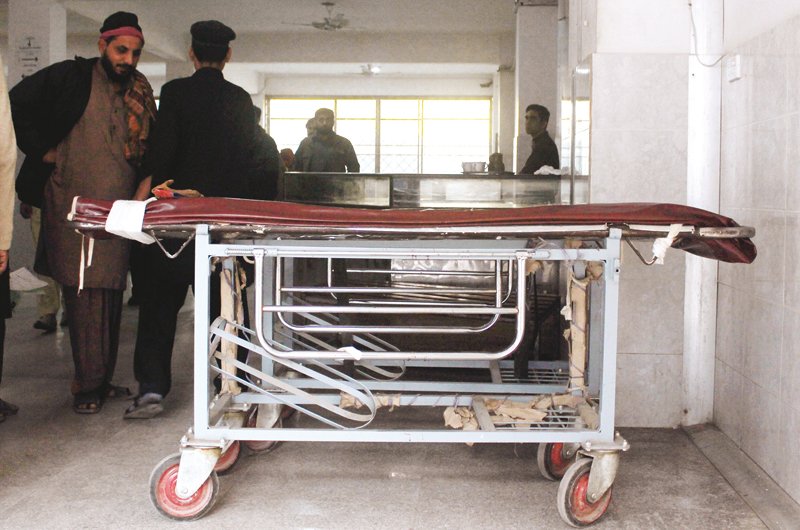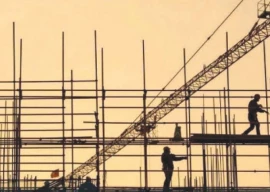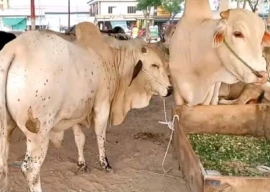
However, what is less obvious at first glance is that the resting rate of the city has changed — the heart does not beat 60 or 80 times per minute but pounds in synchronicity with the reverberations of the blasts. This seems even truer for the 600-odd nurses at the Lady Reading Hospital (LRH) — the default hospital for all emergencies in the city — who watch over the city of flowers, their green thumb weeding out the bullets, snipping off the gangrene and building armatures and grafts for broken bones. As four senior LRH nurses recall their run-in with death and suffering in the wake of a blast, the effect of these traumatic experiences can be seen in their posture, gesticulations and the lines under their eyes.
When terror strikes
“When a blast happens, the patients come straight to our casualty trauma room,” explains Nasreen Qayyum, the head nurse who has been working at the LRH since 1979. The trauma room is where the bulk of the aid is dispensed: first aid, IVs and even on-the-spot X-rays. As nurses triage patients, those in critical condition are sent onwards to surgery or the relevant ward. “We see the patient’s condition, how serious it is and treat them accordingly until they stablise or refer them onwards,” adds another nurse, Gulshanara. The trauma ward has at least five beds along with some space in the basement but victims are also shifted to regular wards in emergency situations. “We have even accommodated hundreds here [during catastrophic events] — that’s when we resort to doubling,” explains Nasreen, referring to the practice of having more than one patient on one hospital bed.

Nurses taking a break from their gruelling shift at the LRH.PHOTO: HALIMA MANSOOR

An injured being rushed to the hospital after the All Saints Church attack. PHOTO: MUHAMMAD IQBAL
As senior nurses, organising things is as important as the work inside the trauma room, reminds Gulshanara. “Three of us remain on duty, one runs to the hostel to summon the girls, while someone gets on the phone to call in off-duty staff,” she adds. The information is also passed on to the zone supervisor and department heads so they can send in more help towards the emergency room. The matron or head nurse usually has a list in advance of who to call and inform during such stressful times. The acting nurse Sumbal Firdous adds that most of the health care professionals rush to the hospital as soon as they hear the news, leaving their own families in the care of others.
When a blast occurs, it’s the ‘girls’ — the nursing staff of the lower cadres, even the ones who are off-duty — who spring into motion. “They don’t have to be told [as the nursing hostel has a bell],” says Gulshanara. “It does not matter to them if they just completed a double shift or if they are at home. None of them will ever say, ‘It isn’t my turn.’” And in those moments, it does not matter if you are a veteran nurse or just an impressionable freshman year trainee
Last breath, first blast
Everyone remembers their first blast. The shock sucks all the noise from the air and only the anxious thud of the heart reverberates against the eardrum. “Wudoodsons, in 1993, was my first. I was a second year nurse,” recalls Nuzzat Aslam, the charge nurse for one of the hospital blocks. “A lot of people died and many were burnt.” The senior nurses who have worked through some of the worst blood baths Peshawar has seen also take trainees through their ‘firsts’. Nasreen recalls the time when the victims from an attack on the Frontier Corps (FC) were brought to the LRH. One of the FC personnel accompanying the victims was suffering from an aftershock and opened fire inside the hospital. “The nursing students with me were petrified and wanted to flee. I asked them, ‘If we run, who will give the patients courage?’” she says. When Nasreen ran into one of those students a few years later and asked her why she looked familiar, the girl replied, “I am the same girl you calmed down that day with the FC, baji. I am no longer scared of things,” she narrates with a smile.

An ambulance parked outside LRH, which is the default hospital for all emergencies. PHOTO: MUHAMMAD IQBAL

Coffins lined up inside the storage area at the LRH. PHOTO: HALIMA MANSOOR
Both young and older nurses might conquer their fear but the memories leave a mark for a long time. The blast at Kohati Chowk took place in 2009 but Gulshanara still remembers it as if it was yesterday. “I stepped into the basement of the trauma ward and they were all in a line with white sheets resting on them… Death lined up,” says Gulshanara. “My heart just stopped.” As nurses and loved ones picked up each sheet to identify the deceased they came across multiple mutilated bodies. The blast also claimed the lives of many children, which are one of the hardest deaths to deal with for the nurses. “They were lying in gurneys in the casualty ward, with different parts of their bodies torn or bloodied,” says Gulshanara. “We stitched them up and sent them home to their parents. But to see those kids, wearing their nice shoes… Their parents had sent them to school in the morning and instead, a dead body is returned home.”
There is a consensus among the nurses that families frantic in search of their loved ones are the biggest challenge at the time of an emergency. “We can’t control the people. We can’t scold or push them away,” says Sumbal. The only way to handle them is subterfuge. Nuzzat recalls the story of Shahzeb, who died in a blast outside a school in Nothia. “His father, who was also injured, was hysterical looking for him.” She had no other option but to lie to him about his son being alive so that he would allow them to tend to his own critical wounds. The family member is only informed once another relative arrives at the hospital or the body of the deceased is sent home.
The legion of white
As the nurses spoke of tending to the dead and injured, it becomes clear that their first and most predominant reaction is fight not flight — not for their own well-being but for others. But the idea of nurses seeking help or counselling for their own trauma seems to be an alien one. According to Chief Nurse Superintendent Gulshan, there is a psychiatry unit at the hospital and “nurses can talk to the doctors there” but that doesn’t really happen.

The entrance to the emergency department at LRH. PHOTO: HALIMA MANSOOR
Experts say that health care professionals in Peshawar who are repeatedly exposed to incidents which can trigger stress reactions are at risk of damaging their coping mechanisms and functionality. But with a complete lack of awareness about stress disorders and their symptoms, these nurses are not even equipped with the vocabulary to identify psychological trauma, let alone seeking help. Unbeknownst to them, it is their words and quiet tears which give them away. Gulshanara talks about how she would “start crying in the middle of random conversations as the memories [of families trying to identify bodies] would resurface.” Nasreen also has a similar story to share. “I try to support the girls and give them comfort, though at first I used to cry all the time.”

Ajmal Kazmi, a senior psychiatric consultant at Karavan-e-Hayat, Karachi, identifies nurses as a high-risk group for Post-Traumatic Stress Disorder (PTSD) along with people hidden in plain sight such as the janitorial staff or ward assistants at hospitals. “They must have PTSD but there is no system or criteria developed based on a local understanding,” he says referring to how ill-equipped the country is to deal with mental health issues. The current criterion for PTSD has been built on Western studies and there is a desperate need for a study that tailors them according to local realities. However, according to Kazmi, even in its current applicability the criterion would apply to many of these nurses.
“After traumatic events, people need to be debriefed about ways to cope with stress and shock — [which includes] everyone from first responders to the general public,” says Kazmi, adding that early diagnosis is key while prevention is even better. “This is a global practice to equip people with the tools that can help prevent PTSD.” He elaborates that creating awareness amongst the general public regarding the stress disorder can help millions. “Early diagnosis, medication and family support can help patients of PTSD recover well,” he says.

The strong medico-legal structures in place in Western countries allow patients with stress disorders to claim compensation. However, Kazmi points out that if one of the nurses here wanted to sit at home and get treatment, they cannot afford to shed the role of the breadwinner. “But if you work in a place where the triggers are constant — recurrent incidents are what cause it — a breaking point will come.” And eventually, the chain of PTSD will affect both personal and professional life.

However, the battles that these nurses are fighting on a daily basis are not limited to terror or trauma. The senior nurses feel the younger ones are not treated fairly by the government. Nasreen cites the example of the scholarship money promised to them which was increased from Rs3,500 to Rs5,000 late last year. “I ask you, ‘has your child ever woken up in the middle of the night and run barefoot to help someone?’ Is the value of that Rs5,000?” she says. The nurses say the cost of books and uniforms alone can eat through the scholarship funds.
New staff nurses get a slightly better deal as they come in on grade 16 and can avail family health care, pension and a conveyance allowance. “Are these girls less human because they come from Chitral or Buner?” says Nasreen. “Or have they become less human or less worthy by wearing these white uniforms.” One of them comments that the former health minister Shaukat Yousafzai (removed from his post after this interview) — who claims to not know anything about their troubles — should spend a day with them and see what they need.
In sickness and in health
“Zindagi ko agar bohat qareeb seh dekhna hai toh aap emergency mein aa jain jis din dhamaka ho (If you want to experience life closely, come to the emergency ward when a blast takes place),” says Nuzzat as she narrates the story of a desperate mother searching for her son.“And you know you just saw the dead body but you keep a stiff upper lip and swear to her that you just dressed his wounds and sent him off, only so she doesn’t have a heart attack,” she elaborates. “As you see her fall to her knees, thanking God for keeping her son safe, you might see the dough that she forgot to wash off her hands because she left her house in such a hurry after receiving news of the blast.”

What might be seen by most as one of the toughest jobs in the country is considered an act of worship by these nurses. “It is a blessing from Allah that he has given us the courage to be here and tend to victims,” says Sumbal. “Otherwise, no one can see fellow humans in such states,” adds Nasreen. “Kiyun ke jab aap gosht khud boriyon mein bhar keh band kar rahay hotay hai, aur kafan dhar-a-dhar phaar rahay hotay hain… Woh dekh dekh ke, insaan khud pagal ho sakta hai (Because when you stuff bodies in sacks and tear shroud regularly… Those things can drive you crazy).” In these moments, it is their faith in God and humanity that keeps these nurses rooted.

“Humanity means to tolerate everyone, even your enemy,” adds Nasreen. But the enemy in their case appears to be playing by completely different rules.
Halima Mansoor is a senior subeditor on The Express Tribune Peshawar desk. She tweets @hmansoor
Published in The Express Tribune, Sunday Magazine, December 14th, 2014.
COMMENTS (3)
Comments are moderated and generally will be posted if they are on-topic and not abusive.
For more information, please see our Comments FAQ
















The real, undisputed heroes of our society. This is something beyond a profession. I always wondered about the doctors and nurses who goes through this blood bath again and again, while no one except the patients noticing their work. I wish authorities takes some out of the way decisions to review their salary packages. Really appreciate Express tribute for highlighting them.
I wish someone in the health department could fight for better packages for these angels in white.
One of the most under rated professions, especially in Pakistan. We see humanitarian aid workers and paramedics and the security forces working in precarious conditions, but I never considered how difficult it must be for nurses, especially when they are so poorly compensated for what they do. I salute these brave souls.